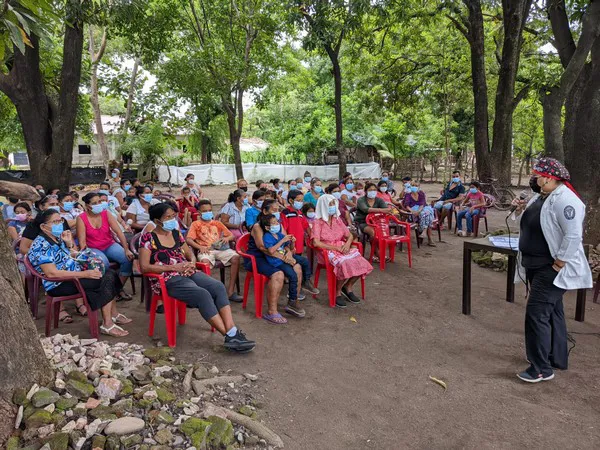Non-governmental organization Global Labor Justice – International Labor Rights Forum (GLJ – ILRF) says that hundreds of Honduran melon workers have protested unsafe working conditions. In a press release, the organization mentioned that seasonal workers marched on the multinational fruit company Fyffes to deliver a petition signed by more than 100 melon farmworkers demanding their international labor rights, including their right to form their own independent union.
According to GLJ-ILRF, the workers are organizing with the independent farmworker union, El Sindicato de Trabajadores de la Agroindustria y Similares (STAS), to resume negotiations for a binding agreement to protect workers’ international labor rights. STAS works in close partnership with GLJ-ILRF. “Workers at these melon plantations want dignity and rights on the job,” said Tomas Membreño, STAS President. “Over one thousand workers are standing strong and fighting for a voice. We’re calling on STAS Fyffes to heed their call and come back to the negotiating table and sign a labor rights agreement that enables workers to form the union they need to ensure safe working conditions and fair pay,” Membreño said.
Response
A Fyffes spokesperson has confirmed that STAS organized a protest with less than 200 people. “They were bussed in from beyond our communities and 0 percent were our workers with three former employees participating,” she said. “We were told that STAS paid them to take part in the protest and when they were asked what they were protesting, they didn’t know.” Fyffes is disappointed GLJ-ILRF has sent out a media release without verifying the information. “They have refused repeated requests for meetings, so that we can hear their concerns,” the Fyffes spokesperson added.
In Honduras, it’s only allowed to have one union for each legal entity. Back in 2019, the Fyffes spokesperson flew to San Pedro Sula where STAS is based to try and find a way for STAS to represent the 43 workers who are affiliated with them, who are working for Fyffes this season. “In the following 2.5 years it became clear that our workers did not wish for STAS to represent them. In February 2022, STAS wrote a letter to Fairtrade USA asking the organization not to re-certify Fyffes’ farms in Honduras. However, this action was negatively received by our employees.” At the request of their employees, Fyffes stopped the negotiations with STAS in July 2022.
This season, Fyffes hired 4,664 seasonal workers on their two melon farms in Choluteca and the companies also employs 221 permanent employees at these farms. “These workers have formed their own independent unions and over 90 percent of permanent workers as well as at least 89 percent of seasonal workers have chosen freely to join a base union at their respective farms.
 Medical brigade organized by Fyffes during the off-season.
Medical brigade organized by Fyffes during the off-season.
Health and safety
According to GLJ – ILRF, workers report they cannot access the government “social security program”, which provides public healthcare. Marcio Noe Garcia, a long-time worker at Fyffes recently collapsed upon arrival at the job and had to be rushed to the hospital. For four seasons, he would wear a chemical sprayer on his back and spray the melon plants. While still unsure what caused the collapse, without “social security” he has not been able to access adequate healthcare and has incurred burdensome costs for medical treatments.
The spokesperson from Fyffes responded by saying that in Honduras, the law does not provide for seasonal workers to receive social security. “As a result, we do not deduct social security from seasonal workers. To ensure seasonal workers have a social safety net, we provide five medical clinics, five ambulances, five doctors, and four nurses. In the past two seasons, we have begun medical brigades – medical outreach into the surrounding communities. This includes providing vaccinations, medicines, consultations, and all treatments that are not provided by the state in those communities.” The Base Unions negotiated seasonal bonuses for the workers, and they negotiated life insurance for all workers, seasonal and permanent.
“We are disappointed to see misinformation from STAS, IUF and GLJ regarding health and safety,” the spokesperson continued. “By far the most important consideration is the safety and wellbeing of our people. There has not been a fatality at our farms in Choluteca but tragically one of our colleagues at another farm nearly 200 km away tragically lost his life due to an accident with a moving forklift. We will continue to do everything in our power to ensure that our health and safety protocols are followed. At one of our farms in Choluteca, we brought two workers to the hospital out of precaution. They had been exposed to a fuel leak from a piece of equipment. They were discharged soon afterwards with no medical implications.”
The company’s farms are regularly audited against labour rights, health and safety by their certifying bodies. “Also, we do regular internal audits and those reports do not indicate any non-conformities. We recently concluded an independent human rights impact assessment on our farms in Honduras using a third party, and we will publish the results in June.”
